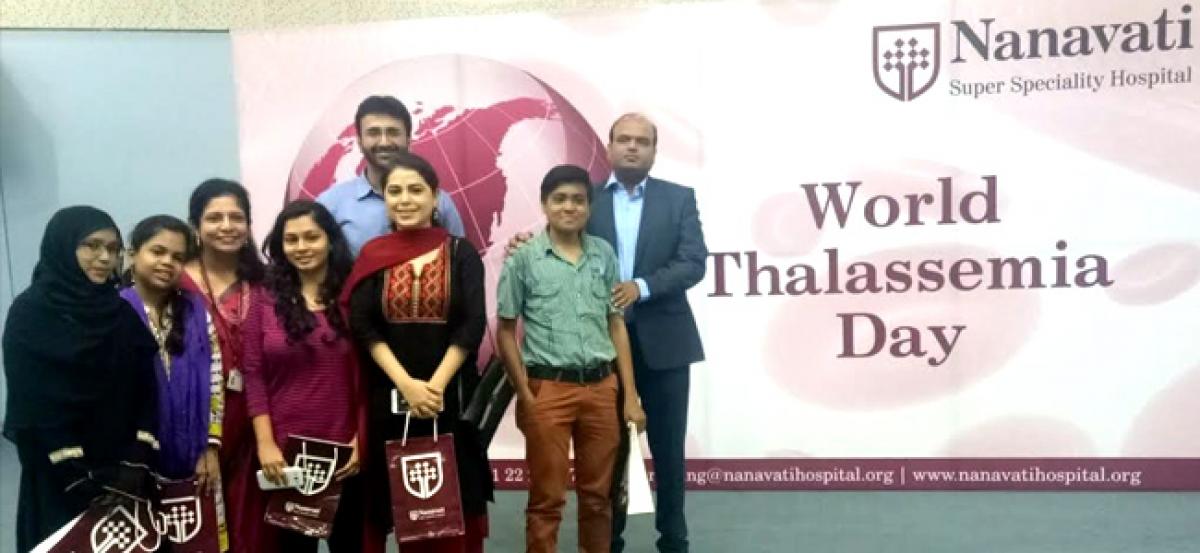Live
- UpStudy: The Smart Solution for Homework Hassles
- Actress Rithika and models inaugurate Sutraa Lifestyle Exhibition
- Loud campaign
- Faculty students celebrated english literature day in Government Degree College
- Huge fire accident.. Shops of street vendors burnt in the fire
- Pawan Kalyan promises to protect the coastal area from sea erosion
- EC Transfers Two Senior IPS Officers in AP ahead of Elections
- DMK analysis predicts victory for INDIA bloc in TN but concedes gains for BJP and NDA too
- India showcasing innovative technologies at World Energy Congress
- IPL 2024: Mitchell comes in for Ravindra as Lucknow opt to bowl first against Chennai
Just In
Genetic testing and improved blood transfusion key to controlling thalassemia, concur NSSH experts


Timely genetic testing and advancements in blood transfusion techniques remain the key to controlling thalassemia, stated medical experts associated with
Timely genetic testing and advancements in blood transfusion techniques remain the key to controlling thalassemia, stated medical experts associated with Nanavati Super Speciality Hospital on the occasion of World Thalassemia Day, May 8. Thalassemia, categorized into alpha thalassemia and beta thalassemia, can broadly be defined as an inherited hematologic disorders caused by defects in one or more haemoglobin chains.
“India comes in the high danger thalassemia belt with 60-70% of the global thalassemia patients coming from the country. Twenty eight genetic mutations are prevalent in India. Education & awareness, community carrier screening, extended family screening, new-born screening, premarital screening and pre-pregnancy screening play a pertinent role in diagnosing the early diagnosis of thalassemia,”stated Dr. Nimish Kulkarni, Associate Consultant, Department of Haemoto-Oncology & Bone Marrow Transplant, NSSH.
A newborn carries a linked pair of alpha globin genes from both parents. Defect in one can lead to alpha thalassemia. Defect in two beta genes can lead to beta thalassemia which can be categorised as beta thalassemia minor, beta thalassemia intermedia and beta thalassemia major.
Commenting on the different variations of thalassemia, Dr. Niranjan Rathod, HOD, Haemato-Oncology Department, NSSH stated, “Beta thalassemia major is not largely symptomatic. Testing of spouses is necessary for planning children. Iron deficiency is the common cause of further drop in Hb and needs iron supplements. The clinical complications of beta thalassemia intermedia is less severe than beta thalassemia major and the treatment regimen includes RBC transfusion for anaemia, chelation for iron overload wherein excess iron is removed through the body by help of special drugs and bone marrow transplant in extreme cases. Beta thalassemia major is the extreme version and can be treated with blood transfusion, iron chelation, bone marrow transplant, splenectomy and bone marrow transplant.”
Children with thalassemia are largely susceptible to osteoporosis. Such children should be encouraged to engage in moderate to high level of physical activity. Patients of thalassemia should strictly desist from smoking.
“Improvement of transfusion medicine technology remains an ongoing process primarily aimed at increasing safety of allogenic blood component transfusions. There is an immediate need of voluntary non-remunerative blood donors to come forward and importance needs to be accorded to pre-blood donation counselling and post-blood donation counselling,”stated Dr. Rinku Bhatia, Head of Blood Transfusion Department, NSSH.

© 2024 Hyderabad Media House Limited/The Hans India. All rights reserved. Powered by hocalwire.com






